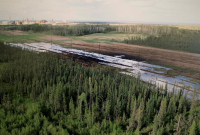Support strong Canadian climate journalism for 2025
The federal government says it is agreeing to an offshore drilling plan that allows up to 21 days to bring in capping technology for a subsea well blowout because requiring a shorter response time would be too expensive for Shell Canada Ltd.
Nova Scotia environmentalists are questioning why the federal environmental protection agency has signed off on a plan that allows between 12 and 21 days for the multinational company to bring a vessel and a capping system to the Shelburne Basin offshore site, about 250 kilometres off the southwestern coast of Nova Scotia.
They are noting that the most recent U.S. ruling in Alaska requires the capping stack to be on hand for a blowout within 24 hours.
In the federal environmental assessment report of June 15, the agency states a blowout in the seven planned wells is unlikely and the project is unlikely to cause significant adverse environmental effects.
In an email sent late Wednesday night, a spokesman for Environment Canada said the Alaska plan to have a vessel and capping system on call was based on the harsh environment in the area and the long distances a vessel would have to travel to get there.
In the case of the Shelburne Basin Project, the Canadian Environmental Assessment Agency "accepted the proponent’s view that it would be prohibitively expensive to develop this infrastructure in Atlantic Canada for exploratory work."
The Canada-Nova Scotia Offshore Petroleum Board still has to approve the plan, which would have a ship travel to the area from Norway if initial methods to stem a blowout in the deepwater wells fail.
A spokeswoman for the agency says it expects to make a decision on the plan this fall, and it is prepared to add conditions to the exploration licence.



Comments